- Home
- William Shakespeare
Hamlet Page 7
Hamlet Read online
Page 7
Through your dominions for his enterprise
On such regards of safety and allowance82
As therein are set down.
KING It likes84 us well,
And at our more considered time85 we'll read,
Answer and think upon this business.
Meantime we thank you for your well-took labour.
Go to your rest: at night we'll feast together.
Most welcome home!
Exeunt Ambassadors
POLONIUS This business is very well ended.
My liege, and madam, to expostulate91
What majesty should be, what duty is,
Why day is day, night night, and time is time,
Were nothing but to waste night, day and time.
Therefore, since brevity is the soul of wit95,
And tediousness the limbs and outward flourishes,
I will be brief: your noble son is mad:
Mad call I it, for, to define true madness98,
What is't but to be nothing else but mad?
But let that go--
GERTRUDE More matter, with less art.
POLONIUS Madam, I swear I use no art at all.
That he is mad, 'tis true: 'tis true 'tis pity,
And pity it is true: a foolish figure104,
But farewell it, for I will use no art.
Mad let us grant him, then, and now remains
That we find out the cause of this effect,
Or rather say, the cause of this defect,
For this effect defective comes by cause109.
Thus it remains, and the remainder thus. Perpend110:
I have a daughter -- have whilst she is mine --
Who, in her duty and obedience, mark,
Hath given me this: now gather, and surmise113.
Shows a letter
The letter
Reads
'To the celestial and my soul's idol, the most beautified
Ophelia'-- That's an ill phrase, a vile phrase:
'beautified' is a vile phrase. But you shall hear these, 'in her
excellent white bosom', these117--
GERTRUDE Came this from Hamlet to her?
POLONIUS Good madam, stay awhile: I will be faithful119.
Reads
'Doubt thou the stars are fire,
Doubt that the sun doth move,
Doubt122 truth to be a liar,
But never doubt I love.
O dear Ophelia, I am ill at these numbers124: I have not art to
reckon my groans125; but that I love thee best, O, most best,
believe it. Adieu. Thine evermore, most dear lady, whilst this
machine is to127 him, Hamlet.'
This in obedience hath my daughter showed me,
And more above129, hath his solicitings,
As they fell out130 by time, by means and place,
All given to mine ear.
KING But how hath she received his love?
POLONIUS What do you think of me?
KING As of a man faithful and honourable.
POLONIUS I would fain135 prove so. But what might you think,
When I had seen this hot love on the wing --
As I perceived it, I must tell you that,
Before my daughter told me -- what might you,
Or my dear majesty your queen here, think,
If I had played the desk or table-book140,
Or given my heart a winking141, mute and dumb,
Or looked upon this love with idle sight142?
What might you think? No, I went round143 to work,
And my young mistress thus I did bespeak144:
'Lord Hamlet is a prince, out of thy star145:
This must not be.' And then I precepts146 gave her
That she should lock herself from his resort147,
Admit no messengers, receive no tokens:
Which done, she took the fruits of my advice,
And he, repulsed -- a short tale to make --
Fell into a sadness, then into a fast,
Thence to a watch152, thence into a weakness,
Thence to a lightness, and, by this declension153
Into the madness whereon now he raves,
And all we wail for.
To Gertrude
KING Do you think 'tis this?
GERTRUDE It may be, very likely.
POLONIUS Hath there been such a time -- I'd fain know that --
That I have positively said ' 'Tis so'
When it proved otherwise?
KING Not that I know.
POLONIUS Take this from this, if this be otherwise:
Points to his head and shoulders?
If circumstances163 lead me, I will find
Where truth is hid, though it were hid indeed
Within the centre165.
KING How may we try166 it further?
POLONIUS You know sometimes he walks four hours together
Here in the lobby.
GERTRUDE So he does indeed.
POLONIUS At such a time I'll loose170 my daughter to him:
To the King
Be you and I behind an arras171 then:
Mark the encounter: if he love her not
And be not from his reason fall'n thereon173,
Let me be no assistant for a state174,
But keep a farm and carters175.
KING We will try it.
Enter Hamlet reading on a book
GERTRUDE But look where sadly177 the poor wretch comes
reading.
POLONIUS Away, I do beseech you both away:
I'll board him presently. O, give me leave180.--
Exeunt King and Queen
How does my good lord Hamlet?
HAMLET Well, God-a-mercy182.
POLONIUS Do you know me, my lord?
HAMLET Excellent, excellent well: you're a fishmonger184.
POLONIUS Not I, my lord.
HAMLET Then I would you were so honest a man.
POLONIUS Honest, my lord?
HAMLET Ay, sir: to be honest, as this world goes, is to be one
man picked out of two thousand.
POLONIUS That's very true, my lord.
HAMLET For if the sun breed maggots in a dead dog, being a
good kissing carrion192-- Have you a daughter?
POLONIUS I have, my lord.
HAMLET Let her not walk i'th'sun: conception194 is a blessing,
but not as your daughter may conceive. Friend, look to't.
Aside
POLONIUS How say you by that? Still harping on my
daughter: yet he knew me not at first; he said I was a
fishmonger. He is far gone, far gone: and truly in my youth I
suffered much extremity for love, very near this. I'll speak to
him again.-- What do you read, my lord?
HAMLET Words, words, words.
POLONIUS What is the matter202, my lord?
HAMLET Between who?
POLONIUS I mean, the matter that you read, my lord.
HAMLET Slanders, sir, for the satirical slave says here that old
men have grey beards, that their faces are wrinkled, their
eyes purging thick amber or plum-tree gum207 and that they
have a plentiful lack of wit, together with weak hams208: all
which, sir, though I most powerfully and potently believe, yet
I hold it not honesty210 to have it thus set down, for you
yourself, sir, should be old211 as I am, if like a crab you could go
backward.
Aside
POLONIUS Though this be madness, yet there is
method in't.-- Will you walk out of the air, my lord?
HAMLET Into my grave?
Aside
POLONIUS Indeed, that is out o'th'air.--
How pregnant sometimes his replies are! A happiness217 that
often madness hits on, which reason and sanity could not so
prosperously be delivered of. I will leave him and suddenly219
contrive the means of meeting between him and my
daughter.-- My honourable lord, I will most humbly take my
leave of you.
HAMLET You cannot, sir, take from me anything that I will
more willingly part withal224: except my life, my life.
POLONIUS Fare you well, my lord.
HAMLET These tedious old fools.
Enter Rosencrantz and Guildenstern
POLONIUS You go to seek my lord Hamlet; there he is.
ROSENCRANTZ God save you, sir!
To Polonius
GUILDENSTERN Mine honoured lord!
[Exit Polonius]
ROSENCRANTZ My most dear lord!
HAMLET My excellent good friends! How dost thou,
Guildenstern? O, Rosencrantz! Good lads, how do ye both?
ROSENCRANTZ As the indifferent233 children of the earth.
GUILDENSTERN Happy234, in that we are not over-happy:
On fortune's cap we are not the very button235.
HAMLET Nor the soles of her shoe?
ROSENCRANTZ Neither, my lord.
HAMLET Then you live about her waist, or in the middle of
her favours239?
GUILDENSTERN Faith, her privates240 we.
HAMLET In the secret parts of fortune? O, most true: she is a
strumpet242. What's the news?
ROSENCRANTZ None, my lord, but that the world's grown honest.
HAMLET Then is doomsday near. But your news is not true.
Let me question more in particular245: what have you, my good
friends, deserved at the hands of fortune that she sends you
to prison hither?
GUILDENSTERN Prison, my lord?
HAMLET Denmark's a prison.
ROSENCRANTZ Then is the world one.
HAMLET A goodly one, in which there are many confines251,
wards252 and dungeons, Denmark being one o'th'worst.
ROSENCRANTZ We think not so, my lord.
HAMLET Why, then, 'tis none to you; for there is nothing
either good or bad but thinking makes it so: to me it is a
prison.
ROSENCRANTZ Why then, your ambition makes it one: 'tis too
narrow for your mind.
HAMLET O God, I could be bounded in a nutshell and count
myself a king of infinite space, were it not that I have bad
dreams.
GUILDENSTERN Which dreams indeed are ambition, for the very
substance of the ambitious263 is merely the shadow of a dream.
HAMLET A dream itself is but a shadow.
ROSENCRANTZ Truly, and I hold ambition of so airy and light a
quality that it is but a shadow's shadow.
HAMLET Then are our beggars bodies, and our monarchs267
and outstretched268 heroes the beggars' shadows. Shall we to
th'court? For, by my fay269, I cannot reason.
BOTH We'll wait upon270 you.
HAMLET No such matter: I will not sort271 you with the rest of
my servants, for, to speak to you like an honest man, I am
most dreadfully attended. But, in the beaten way273 of
friendship, what make you at Elsinore?
ROSENCRANTZ To visit you, my lord, no other occasion.
HAMLET Beggar that I am, I am even poor in thanks; but I
thank you, and sure, dear friends, my thanks are too dear a277
halfpenny. Were you not sent for? Is it your own inclining? Is
it a free visitation? Come, deal justly with me: come, come;
nay, speak.
GUILDENSTERN What should we say, my lord?
HAMLET Why, anything, but to the purpose282. You were sent
for, and there is a kind of confession in your looks which
your modesties have not craft enough to colour284: I know the
good king and queen have sent for you.
ROSENCRANTZ To what end, my lord?
HAMLET That you must teach me. But let me conjure287 you, by
the rights of our fellowship, by the consonancy288 of our youth,
by the obligation of our ever-preserved love, and by what289
more dear a better proposer could charge290 you withal, be
even291 and direct with me whether you were sent for or no?
Aside to Guildenstern?
ROSENCRANTZ What say you?
Aside?
HAMLET Nay, then, I have an eye of293 you.--
If you love me, hold not off.
GUILDENSTERN My lord, we were sent for.
HAMLET I will tell you why; so shall my anticipation prevent296
your discovery, and your secrecy to the king and queen
moult no feather298. I have of late -- but wherefore I know not
-- lost all my mirth, forgone all custom of exercise299; and
indeed it goes so heavily300 with my disposition that this goodly
frame, the earth, seems to me a sterile promontory301, this most
excellent canopy, the air, look you, this brave302 o'erhanging
firmament, this majestical roof fretted303 with golden fire, why,
it appears no other thing to me than a foul and pestilent
congregation of vapours. What a piece of work is a man!
How noble in reason, how infinite in faculty, in form and
moving how express307 and admirable, in action how like an
angel, in apprehension308 how like a god! The beauty of the
world, the paragon of animals -- and yet, to me, what is this
quintessence310 of dust? Man delights not me -- no, nor
woman neither, though by your smiling you seem to say so.
ROSENCRANTZ My lord, there was no such stuff in my thoughts.
HAMLET Why did you laugh when I said 'Man delights not
me'?
ROSENCRANTZ To think, my lord, if you delight not in man,
what Lenten entertainment316 the players shall receive from
you: we coted317 them on the way, and hither are they coming
to offer you service.
HAMLET He that plays the king shall be welcome; his majesty
shall have tribute320 of me: the adventurous knight shall use
his foil and target: the lover shall not sigh gratis321: the
humorous322 man shall end his part in peace: the clown shall
make those laugh whose lungs are tickled o'th'sear323: and the
lady shall say her mind freely, or the blank verse shall halt324
for't. What players are they?
ROSENCRANTZ Even those you were wont326 to take delight in, the
tragedians of the city.
HAMLET How chances it they travel? Their residence328, both in
reputation and profit, was better both ways.
ROSENCRANTZ I think their inhibition330 comes by the means of
the late innovation331.
HAMLET Do they hold the same estimation332 they did when I
was in the city? Are they so followed?
ROSENCRANTZ No, indeed, they are not.
HAMLET How comes it? Do they grow rusty?
ROSENCRANTZ Nay, their endeavour keeps in the wonted pace.
But there is, sir, an eyrie of children, little eyases, that cry out337
on the top of question and are most tyrannically338 clapped
for't: these are now the fashion, and so berattle the common339
stages -- so they call them -- that many wearing rapiers are340
afraid of goose-quills and dare scarce come thither.
HAMLET What, are they children? Who maintains 'em? How
are they escoted? Will they pursue the quality no longer than343
they can sing? Will they not say afterwards, if they should
grow themselves to common players -- as it is most like345, if
their means346 are no bet
ter -- their writers do them wrong, to
make them exclaim against their own succession347?
ROSENCRANTZ Faith, there has been much to-do on both sides,
and the nation holds it no sin to tar349 them to controversy.
There was for a while no money bid for argument unless the350
poet and the player went to cuffs in the question.
HAMLET Is't possible?
GUILDENSTERN O, there has been much throwing about of
brains.
HAMLET Do the boys carry it away355?
ROSENCRANTZ Ay, that they do, my lord: Hercules and his load356
too.
HAMLET It is not strange, for mine uncle is King of Denmark,
and those that would make mows359 at him while my father
lived, give twenty, forty, an hundred ducats360 a-piece for his
picture in little. There is something in this more than361
natural, if philosophy362 could find it out.
Flourish for the Players
GUILDENSTERN There are the players.
HAMLET Gentlemen, you are welcome to Elsinore. Your hands,
come: the appurtenance365 of welcome is fashion and ceremony:
let me comply with you in the garb, lest my extent366 to the
players -- which, I tell you, must show fairly367 outward --
should more appear like entertainment368 than yours. You are
welcome: but my uncle-father and aunt-mother are deceived.
GUILDENSTERN In what, my dear lord?
HAMLET I am but mad north-north-west371: when the wind is
southerly I know a hawk from a handsaw372.
Enter Polonius
POLONIUS Well be with you, gentlemen.
HAMLET Hark you, Guildenstern, and you too -- at each ear
a hearer: that great baby you see there is not yet out of his
swathing-clouts376.
ROSENCRANTZ Happily377 he's the second time come to them, for
they say an old man is twice a child.
HAMLET I will prophesy: he comes to tell me of the players,
mark it.-- You say right, sir: for a Monday morning, 'twas so380
indeed.
POLONIUS My lord, I have news to tell you.
HAMLET My lord, I have news to tell you.
When Roscius384, an actor in Rome--
POLONIUS The actors are come hither, my lord.
HAMLET Buzz, buzz386!
POLONIUS Upon mine honour--
HAMLET Then came each actor on his ass388--
POLONIUS The best actors in the world, either for tragedy,
comedy, history, pastoral, pastorical-comical, historical—
pastoral, tragical-historical, tragical-comical-historical—
pastoral, scene individable, or poem unlimited. Seneca392
cannot be too heavy, nor Plautus too light. For the law of393
writ and the liberty, these are the only men.
HAMLET O Jephthah, judge of Israel, what a treasure hadst395
thou!
POLONIUS What a treasure had he, my lord?
HAMLET Why,
'One fair daughter and no more399,
The which he loved passing400 well.'
Aside
POLONIUS Still on my daughter.
HAMLET Am I not i'th'right, old Jephthah?

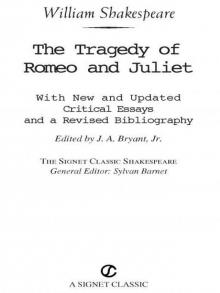 Romeo and Juliet
Romeo and Juliet As You Like It (Folger Shakespeare Library)
As You Like It (Folger Shakespeare Library)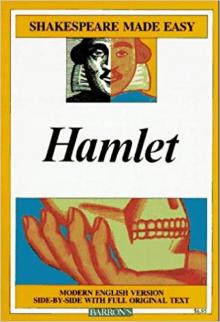 Hamlet
Hamlet Richard II (Folger Shakespeare Library)
Richard II (Folger Shakespeare Library) Macbeth
Macbeth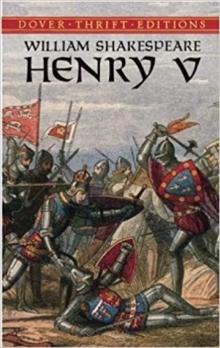 Henry V
Henry V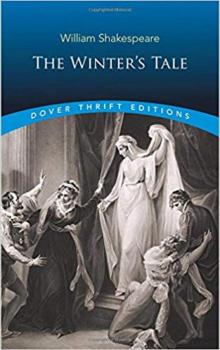 The Winter's Tale
The Winter's Tale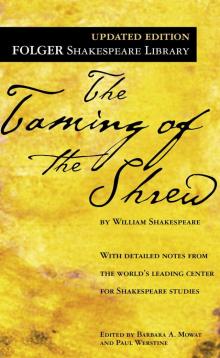 The Taming of the Shrew
The Taming of the Shrew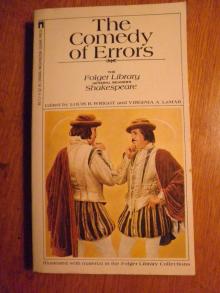 The Comedy of Errors
The Comedy of Errors King Lear (Folger Shakespeare Library)
King Lear (Folger Shakespeare Library)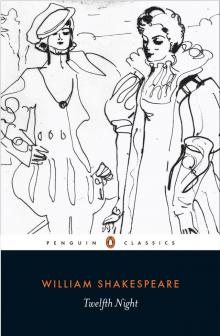 Twelfth Night
Twelfth Night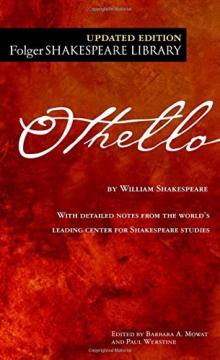 Othello
Othello The Two Gentlemen of Verona
The Two Gentlemen of Verona Henry IV, Part 1 (Folger Shakespeare Library)
Henry IV, Part 1 (Folger Shakespeare Library) King John/Henry VIII (Signet Classics)
King John/Henry VIII (Signet Classics)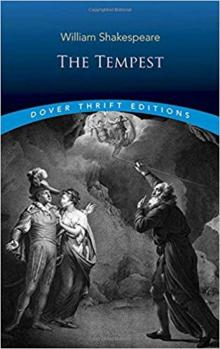 The Tempest
The Tempest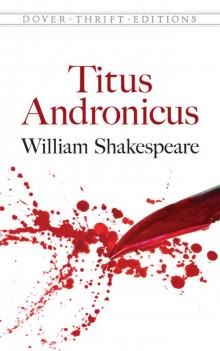 Titus Andronicus (Dover Publications)
Titus Andronicus (Dover Publications)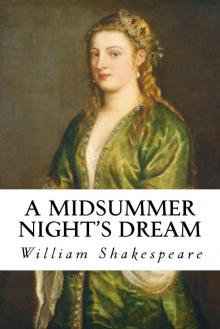 A Midsummer Night's Dream
A Midsummer Night's Dream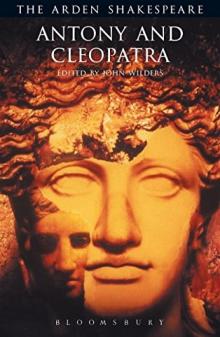 Antony and Cleopatra (Arden Shakespeare: Third Series)
Antony and Cleopatra (Arden Shakespeare: Third Series)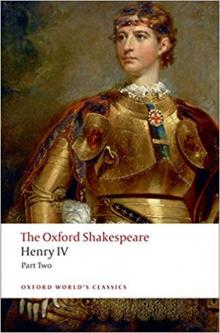 The Oxford Shakespeare: Henry IV, Part 2 (Oxford World's Classics)
The Oxford Shakespeare: Henry IV, Part 2 (Oxford World's Classics)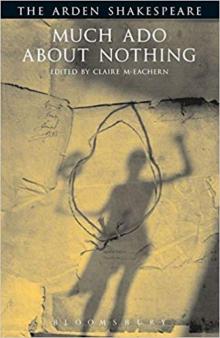 Much Ado About Nothing (Arden Shakespeare: Third Series)
Much Ado About Nothing (Arden Shakespeare: Third Series) All's Well That Ends Well
All's Well That Ends Well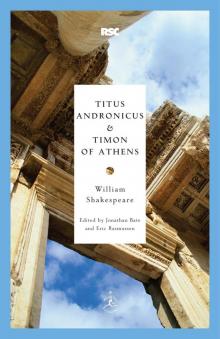 Titus Andronicus & Timon of Athens
Titus Andronicus & Timon of Athens Richard III (Modern Library Classics)
Richard III (Modern Library Classics)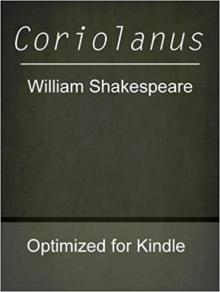 Coriolanus
Coriolanus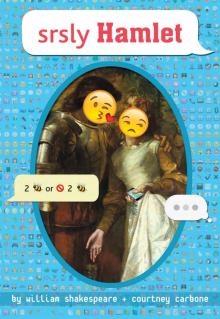 srsly Hamlet (OMG Shakespeare)
srsly Hamlet (OMG Shakespeare)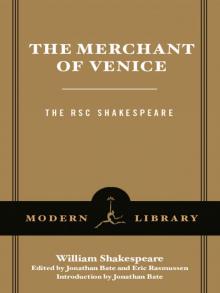 The Merchant of Venice
The Merchant of Venice Richard III
Richard III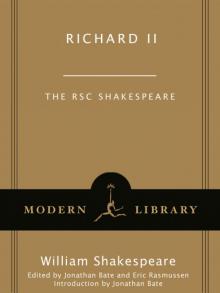 Richard II
Richard II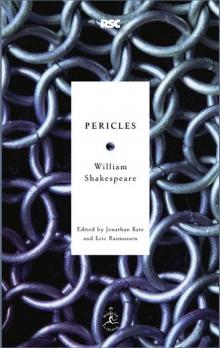 Pericles
Pericles As You Like It
As You Like It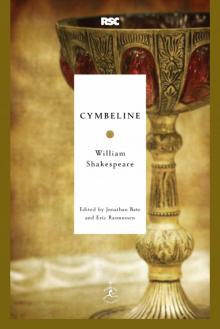 Cymbeline
Cymbeline Alls Wel that ends Well
Alls Wel that ends Well YOLO Juliet
YOLO Juliet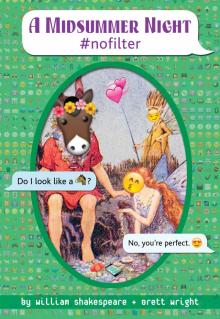 A Midsummer Night #nofilter
A Midsummer Night #nofilter Love's Labour's Lost
Love's Labour's Lost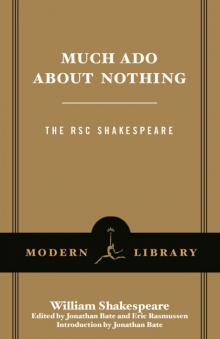 Much Ado About Nothing
Much Ado About Nothing Romeo & Juliet & Vampires
Romeo & Juliet & Vampires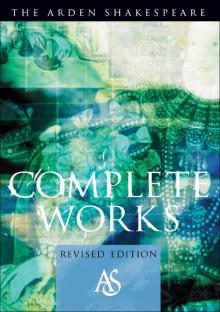 The Arden Shakespeare Complete Works
The Arden Shakespeare Complete Works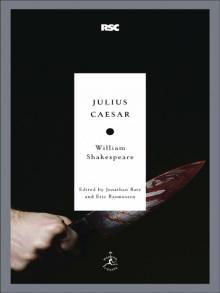 Julius Caesar
Julius Caesar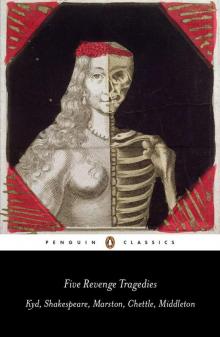 Five Revenge Tragedies: The Spanish Tragedy, Hamlet, Antonio's Revenge, The Tragedy of Hoffman, The Revenger's Tragedy (Penguin Classics)
Five Revenge Tragedies: The Spanish Tragedy, Hamlet, Antonio's Revenge, The Tragedy of Hoffman, The Revenger's Tragedy (Penguin Classics)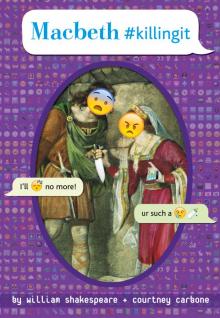 Macbeth #killingit
Macbeth #killingit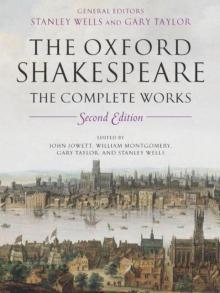 The Oxford Shakespeare: The Complete Works
The Oxford Shakespeare: The Complete Works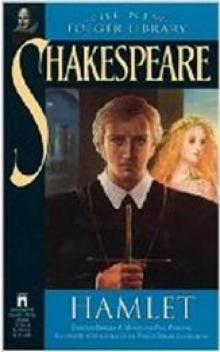 Hamlet, Prince of Denmark (Collins edition)
Hamlet, Prince of Denmark (Collins edition) King John & Henry VIII
King John & Henry VIII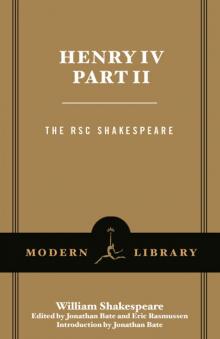 Henry IV, Part 2
Henry IV, Part 2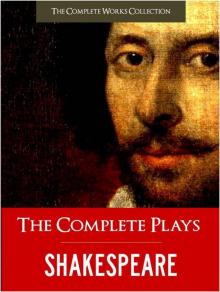 Complete Plays, The
Complete Plays, The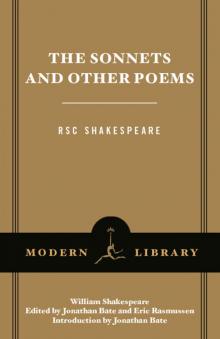 The Sonnets and Other Poems
The Sonnets and Other Poems Antony and Cleopatra
Antony and Cleopatra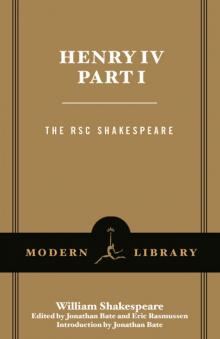 Henry IV, Part 1
Henry IV, Part 1 Is This a Dagger Which I See Before Me?
Is This a Dagger Which I See Before Me?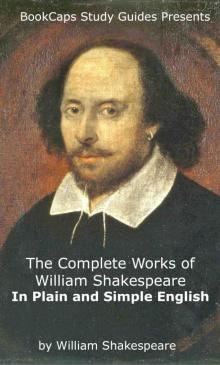 The Complete Works of William Shakespeare In Plain and Simple English (Translated)
The Complete Works of William Shakespeare In Plain and Simple English (Translated) The Sonnets
The Sonnets